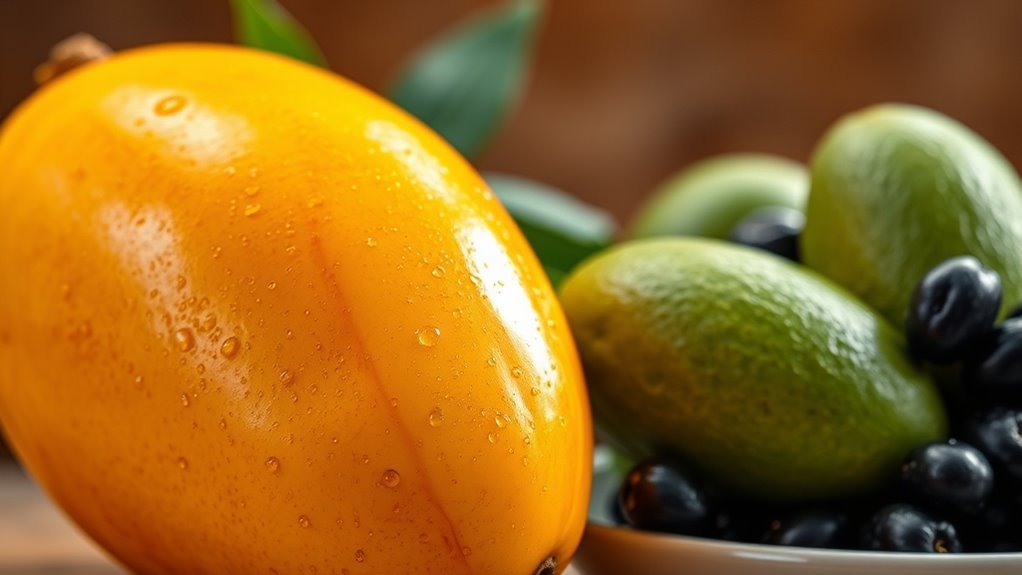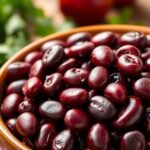Mangoes are delicious but relatively high in carbohydrates, containing about 15 grams per 100 grams. This can make them challenging for a keto diet since too many carbs can impact ketosis. You can still enjoy mangoes by practicing portion control, opting for small servings that fit your daily carb limit. Balancing your intake with healthy fats can help manage blood sugar levels. Keep exploring to find out how to include mangoes thoughtfully in your low-carb lifestyle.
Nutritional Profile of Mangoes
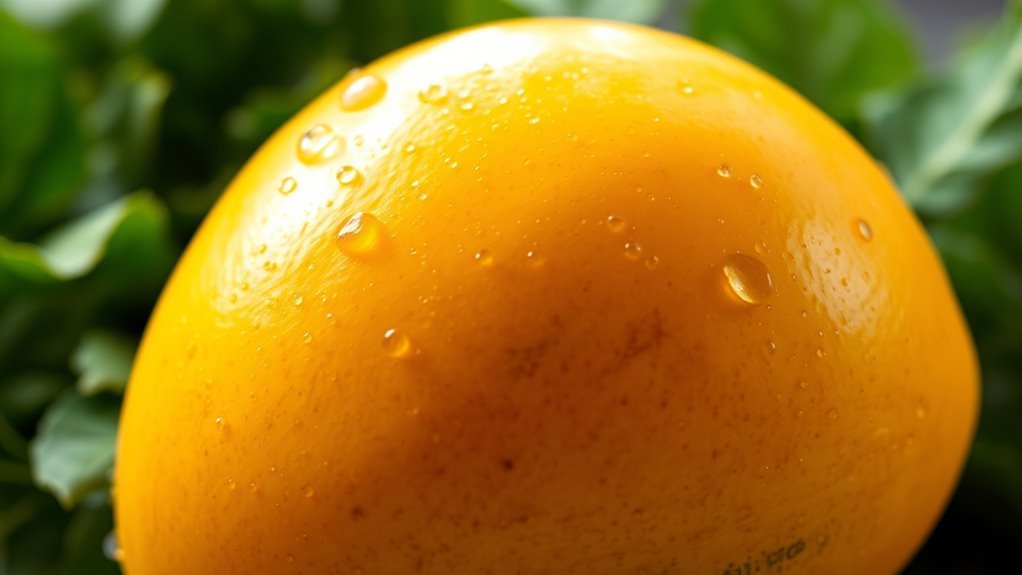
When it comes to understanding the nutritional profile of mangoes, you’ll find a mix of vitamins, minerals, and natural sugars that make this tropical fruit both delicious and nutritious. Different mango varieties, like Haden and Tommy Atkins, offer unique flavors and slightly varying nutrient compositions. Generally, mangoes are rich in vitamin C, which supports your immune system, and vitamin A, essential for eye health. They also provide dietary fiber, promoting digestive health. While mangoes do contain natural sugars, their overall health benefits often outweigh concerns for most people. Incorporating these tropical fruits into your diet can enhance your meals while providing crucial nutrients, allowing you to enjoy their sweet taste without sacrificing your nutritional goals.
Carbohydrate Content in Mangoes
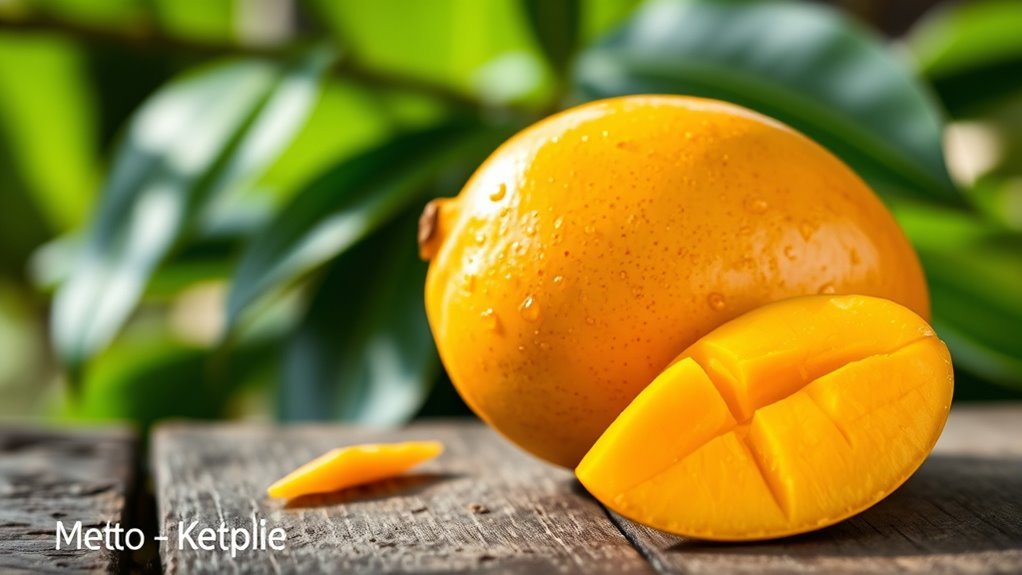
Mangoes contain about 15 grams of carbohydrates per 100 grams, making them relatively high in carbs compared to many other fruits. The sugar content in mangoes varies among different mango varieties; for instance, Ataulfo mangoes tend to have a sweeter profile with higher sugars, while Tommy Atkins mangoes are less sweet. This variability means that not all mangoes are created equal when it comes to carbohydrate intake. If you’re considering a low-carb lifestyle, you’ll want to be mindful of how many mangoes you include in your diet. While their natural sweetness is tempting, balancing your intake with other lower-carb fruits can help you maintain your nutritional goals without feeling restricted. Enjoying mangoes in moderation can be a tasty addition to your meals.
Impact of Mangoes on Ketosis
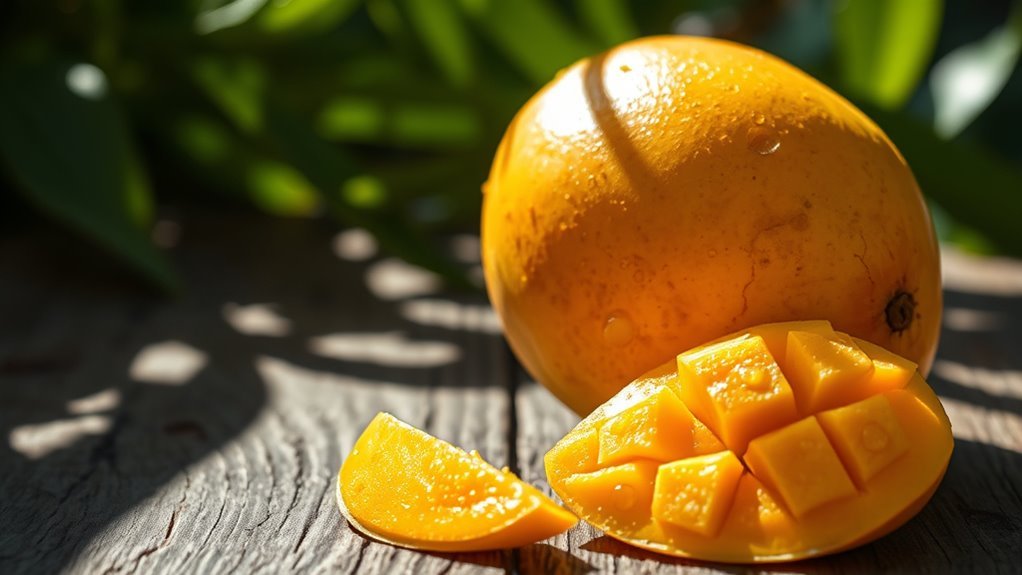
Including mangoes in your diet while following a ketogenic lifestyle requires careful consideration due to their carbohydrate content. While delicious, mangoes can impact your keto adaptation if consumed in significant amounts. Here are some factors to keep in mind regarding fruit selection:
- High in natural sugars, which can hinder ketosis
- Provide vitamins and antioxidants beneficial for overall health
- Can be enjoyed in moderation if you carefully track carbs
- Alternatives like berries may better fit a keto plan
- Individual responses to carbs can vary greatly
Ultimately, if you crave mangoes, it’s essential to balance your intake with your daily carb limits. Understanding their impact on ketosis can help you make more informed choices and enjoy your freedom within the keto framework.
Portion Control: Enjoying Mangoes on Keto
While it might seem tempting to indulge in a juicy mango, practicing portion control is essential for those adhering to a ketogenic diet. Mangoes are delicious but can be high in carbs, so it’s crucial to keep your portion sizes in check. Aim for about half a medium mango, which contains around 15 grams of net carbs. This allows you to enjoy the fruit without derailing your keto goals. Embrace mindful eating by savoring each bite and being aware of how it fits into your daily carb allowance. By balancing your love for mangoes with sensible portions, you can relish their sweetness while staying true to your ketogenic lifestyle. Remember, moderation is key to enjoying the freedom of your dietary choices!
Alternatives to Mangoes for a Keto Diet
If you’re looking for alternatives to mangoes on a keto diet, there are plenty of low-carb fruit options to evaluate. Berries like strawberries and raspberries can satisfy your sweet tooth while keeping your carb intake in check. Additionally, you might explore keto-friendly snacks that incorporate nuts or cheese for a satisfying treat without the added sugars.
Low-Carb Fruits Options
Although mangoes are delicious and packed with nutrients, they’re not the best choice for a keto diet due to their higher carbohydrate content. Fortunately, there are plenty of low-carb fruit options that can satisfy your sweet cravings without derailing your ketosis. Consider incorporating the following into your meals:
- Raspberries (high in fiber and low in carbs)
- Strawberries (great for smoothies or salads)
- Blackberries (full of vitamins and antioxidants)
- Avocado (technically a fruit, rich in healthy fats)
- Lemons (perfect for flavoring water or dishes)
Pair these low-carb berries with keto-friendly vegetables for a balanced diet. With these options, you can enjoy the freedom of delicious choices while sticking to your keto lifestyle.
Keto-Friendly Snack Ideas
When you’re following a keto diet, finding satisfying snacks that won’t kick you out of ketosis can be a challenge, especially if you’re craving something sweet like mangoes. Fortunately, there are plenty of keto-friendly snack ideas that can fulfill your cravings while keeping your carb intake low. Consider snacking on avocados, which are packed with healthy fats and fiber. Another option is coconut chips or unsweetened dark chocolate, both of which can satisfy your sweet tooth without derailing your diet. Additionally, cheese crisps and nut butter with celery offer a crunchy and creamy combo rich in healthy fats. By choosing these alternatives, you’ll enjoy delicious snacks while staying committed to your keto lifestyle.
Health Benefits of Mangoes
Mangoes are packed with essential nutrients, including vitamins A and C, which support immune function and skin health. Their antioxidant properties can help combat oxidative stress, contributing to overall well-being. Incorporating mangoes into your diet can provide both flavor and a range of health benefits.
Nutrient-Rich Profile
While many people think of mangoes primarily as a delicious tropical fruit, their nutrient-rich profile offers a range of health benefits that can enhance your overall well-being. Different mango varieties boast high nutrient density, providing you with essential vitamins and minerals. By incorporating mangoes into your diet, you can enjoy the following benefits:
- Rich in vitamin C, supporting your immune system
- Contains vitamin A, promoting healthy vision
- Packed with fiber, aiding digestion
- Provides potassium, helping maintain blood pressure levels
- Offers folate, essential for cell growth and metabolism
These nutrients can contribute to a balanced diet, making mangoes a tasty and beneficial addition to your meals while enjoying the freedom of diverse flavors.
Antioxidant Properties
The health benefits of mangoes extend beyond their rich nutrient profile, particularly due to their impressive antioxidant properties. Mango antioxidants, such as quercetin and beta-carotene, help combat oxidative stress, which can lead to chronic diseases. By incorporating mangoes into your diet, you’re not just enjoying a delicious fruit; you’re also enhancing your body’s defense mechanisms.
| Antioxidant | Health Benefit | Source in Mangoes |
|---|---|---|
| Quercetin | Reduces inflammation | Flesh and skin |
| Beta-Carotene | Supports eye health | Flesh |
| Mangiferin | May have anti-cancer properties | Flesh and seed |
| Vitamin C | Boosts immune system | Flesh |
| Polyphenols | Improves heart health | Flesh and skin |
Embracing mangoes can be a tasty way to promote your overall health!
Tips for Including Mangoes in a Low-Carb Diet
If you’re looking to enjoy mangoes while staying within a low-carb diet, it’s important to be mindful of your portion sizes and overall carb intake. Here are some tips to help you incorporate mangoes without compromising your goals:
- Choose small mangoes to control portion sizes.
- Use mangoes as a flavorful addition in keto desserts.
- Blend mangoes into smoothies with low-carb ingredients.
- Pair mango slices with nuts or cheese for a balanced snack.
- Experiment with mango recipes that emphasize low-carb ingredients.
Common Misconceptions About Fruits on Keto
Many people mistakenly believe that all fruits are off-limits on a keto diet due to their natural sugar content. This is one of the most common fruit misconceptions. While it’s true that some fruits are higher in carbs, many low-carb options, like berries and avocados, can fit into your meal plan. Keto myths often create a fear of fruit, but moderation is key. You can enjoy certain fruits without derailing your progress. It’s crucial to focus on the nutritional value fruits provide, such as vitamins, minerals, and antioxidants. By understanding which fruits are lower in carbs, you can embrace a more balanced approach to your keto lifestyle, enjoying the freedom to include a variety of flavors.
Conclusion: Should You Include Mangoes in Your Keto Meal Plan?
Including mangoes in your keto meal plan requires careful consideration of their carbohydrate content. While they’re delicious and packed with nutrients, their higher sugar levels can challenge your keto guidelines. If you’re tempted by mango recipes, here are some points to keep in mind:
- Moderation is key: Small portions may fit into your carb limit.
- Track your macros: Monitor your daily carbohydrate intake.
- Pair wisely: Combine mango with healthy fats to balance blood sugar.
- Consider alternatives: Opt for lower-carb fruits if you’re close to your limit.
- Experiment: Try incorporating mango in dishes where it enhances flavor without overloading on carbs.
Ultimately, it’s about finding that balance that lets you enjoy your meals while staying true to your keto journey.
Frequently Asked Questions about Mangoes and the Keto Diet
1. Are mangoes low in carbohydrates?
Mangoes are relatively high in carbohydrates compared to other fruits. One medium-sized mango contains about 45 grams of carbohydrates, which may not align with the strict carbohydrate limits of a ketogenic diet. If you are on a strict keto plan, it’s essential to monitor your overall carb intake, as consuming mangoes can take you over your daily limit.
2. Can I eat mangoes on a keto diet?
While some people on a keto diet may choose to include small amounts of mango in their diet, it’s generally advisable to avoid them due to their high sugar content. If you really want to enjoy mangoes, consider using them sparingly in recipes or as a garnish, while ensuring you stay within your daily carbohydrate limits.
3. What are the alternatives to mangoes on a keto diet?
If you’re looking for fruits that are more compatible with a keto diet, consider options like avocados, berries (such as strawberries and raspberries), and olives. These fruits are lower in carbohydrates and can be enjoyed in moderation while still allowing you to maintain ketosis.
4. What is the sugar content in mangoes?
A medium-sized mango contains about 39 grams of sugar. This high sugar content is primarily in the form of natural sugars, such as fructose, which can impact your blood sugar levels. For those on a ketogenic diet, this significant amount of sugar can hinder the ability to stay in ketosis.
5. How can I include fruits in my keto diet healthily?
To include fruits in your keto diet, focus on low-carb options and consume them in moderation. Always track your carbohydrate intake and opt for fruits that are rich in fiber and lower in sugar. Pair fruits with healthy fats, like nuts or avocados, to help mitigate blood sugar spikes and stay within your daily carb allowance.
References
- https://www.healthline.com/nutrition/low-carb-fruits
- https://www.ncbi.nlm.nih.gov/pmc/articles/PMC6014252/
- https://www.dietdoctor.com/low-carb/fruits
- https://www.mayoclinic.org/healthy-lifestyle/nutrition-and-healthy-eating/in-depth/carbohydrates/art-20045485
- https://www.webmd.com/diet/obesity/what-is-keto-diet
- https://www.eatright.org/health/wellness/preventing-illness/the-ketogenic-diet
- https://www.verywellfit.com/what-is-the-ketogenic-diet-5113787
